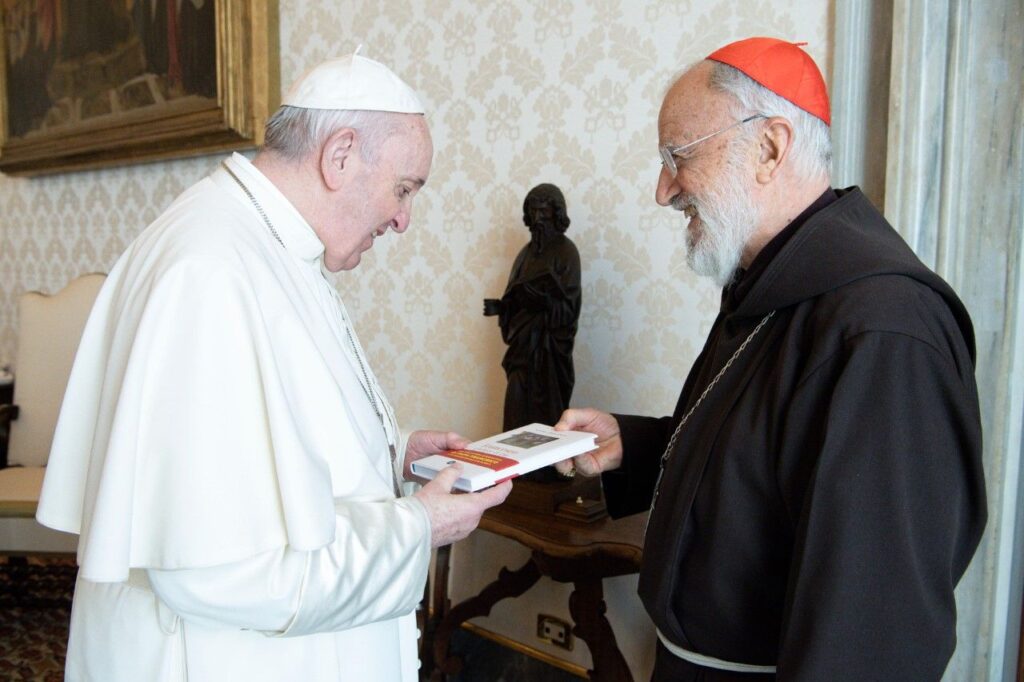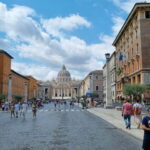Tempo di lettura: 22 minuti
Read and listen to the prayer of the "Magnificat"
Summary
Italian
My soul magnifies the Lord
e il mio spirito esulta in Dio, mio salvatore,
because he looked at the humility of his servant.
From now on all generations will call me blessed.
The Almighty has done great things for me
and Santo is his name:
his mercy from generation to generation
he lays down on those who fear him.
He explained the power of his arm,
he has scattered the proud in the thoughts of their hearts;
he overthrew the mighty from their thrones,
he lifted up the lowly;
he has filled the hungry with good things,
sent the rich away empty handed.
He has helped his servant Israel,
remembering his mercy,
as he promised our fathers,
to Abraham and his descendants forever.
Gloria al Padre e al Figlio
and to the Holy Spirit.
As it was in the beginning, and now and always
forever and ever.
Amen.
Latin
Magnificat
Anima mea Dominum,
et exsultávit spíritus meus
in Deo salvatore meo,
quia respéxit humilitátem ancíllæ suæ.
Ecce enim ex hoc beátam me dicent
all generations,
quia fecit mihi magna, qui potens est,
et sanctum nomen eius,
et misericórdia eius in progénies et progénies
timentibus eum.
Fecit poténtiam in his branch,
dispérsit superbos mente cordis sui;
depósuit poténtes de sede
et exaltávit humiles;
esuriéntes implévit bonis
et dívites dimísit inánes.
Suscépit Israel puerum suum,
recordátus misericórdiæ,
sicut locútus est ad patres nostras,
Abraham et sémini eius in sæcula.
Glória Patri, et Fílio
et Spiritui Sancto.
Sicut erat in principle, et nunc et semper,
et in sǽcula sæculórum.
Amen.

Commentary on the Magnificat
In questa meditazione saliamo con Maria “verso la montagna” ed entriamo nella casa di Elisabetta.
La Madre di Dio ci parlerà in prima persona con il suo cantico di lode che è il Magnificat.
Oggi tutta la Chiesa si stringe intorno al successore di Pietro che celebra il suo 50° di sacerdozio e il cantico della Vergine è la preghiera che più spontaneamente sale dal cuore in circostanze come questa. Una meditazione su di esso è un nostro piccolo modo di partecipare anche in questo momento a tale ricorrenza.
Per comprendere il posto e lo scopo che il cantico della Vergine ha nel vangelo di Luca, è necessario premettere qualche cenno sui cantici evangelici in genere.
The hymns scattered in the infancy gospels - Benedictus, Magnificat, Nunc dimittis - have the function of poetically explaining the spiritual meaning of the events narrated - Annunciation, Visitation, Christmas -, giving them the form of a confession of faith and praise.
As such, they are an integral part of the historical narrative.
They are not interludes or detached passages, because every historical event is made up of two elements: the fact and the meaning of the fact.
I cantici inseriscono già la liturgia nella storia. “La liturgia cristiana – è stato scritto – ha i suoi inizi negli inni della storia dell’infanzia”.
We have, in other words, in these canticles, an embryo of the Christmas liturgy.
They realize the essential element of the liturgy which is to be a festive and believing celebration of the event of salvation.
Molti problemi rimangono insoluti circa questi cantici, secondo gli studiosi: gli autori reali, le fonti, la struttura interna…
Noi possiamo prescindere, fortunatamente, da tutti questi problemi critici e lasciare che essi continuino a essere studiati con frutto da quelli che si occupano di questo genere di problemi.
Non dobbiamo attendere che siano risolti tutti questi punti oscuri, per poterci già edificare con questi cantici.
Non perché tali problemi non siano importanti, ma perché esiste una certezza che relativizza tutte quelle incertezze: Luca ha accolto questi cantici nel suo vangelo e la Chiesa ha accolto il Vangelo di Luca nel suo canone.
Questi cantici sono “parola di Dio”, ispirata dallo Spirito Santo.
The Magnificat is Mary's because the Holy Spirit "attributed" it to her and this makes it more "hers" than if she had actually written it in her own hand!
Infatti a noi non interessa tanto sapere se il Magnificat l’ha composto Maria, quanto sapere se l’ha composto per ispirazione dello Spirito Santo.
Even if we were very certain that it was composed directly by Mary, it would not interest us for this, but because the Holy Spirit speaks in it.
Il cantico di Maria contiene uno sguardo nuovo su Dio e sul mondo; nella prima parte, che abbraccia i versetti 46-50, lo sguardo di Maria si porta su Dio; nella seconda parte, che abbraccia i restanti versetti, il suo sguardo si porta sul mondo e la storia.
A new look at God
Il primo movimento del Magnificat è verso Dio; Dio ha il primato assoluto su tutto.
Maria non si attarda a rispondere al saluto di Elisabetta; non entra in dialogo con gli uomini, ma con Dio. Ella raccoglie la sua anima e la inabissa nell’infinito che è Dio.
Nel Magnificat è stata “fissata” per sempre un’esperienza di Dio senza precedenti e senza paragoni nella storia. È l’esempio più sublime del linguaggio cosiddetto numinoso.
È stato osservato che l’affacciarsi della realtà divina all’orizzonte di una creatura produce, di solito, due sentimenti contrapposti: uno di timore e uno di amore. Dio si presenta come “il mistero tremendo e affascinante”, tremendo per la sua maestà, affascinante per la sua bontà.
Quando la luce di Dio, per la prima volta, brillò nell’anima di Agostino, egli confessa che “tremò di amore e di terrore” e che anche in seguito il contatto con Dio lo faceva “rabbrividire e ardere” insieme.
We find something similar in Mary's canticle, expressed in a biblical way, through the titles.
Dio è visto come “Adonai” (che dice molto di più del nostro “Signore” con cui viene tradotto), come “Dio”, come “Potente” e soprattutto come Qadosh, “Santo”: Santo è il suo nome!
Nello stesso tempo, però, questo Dio santo e potente, è visto, con infinita fiducia, come “mio Salvatore”, come realtà benevola, amabile, come “proprio” Dio, come un Dio per la creatura.
Ma è soprattutto l’insistenza di Maria sulla misericordia che mette in luce questo aspetto benevolo e “affascinante” della realtà divina.
“La sua misericordia si stende di generazione in generazione”: queste parole suggeriscono l’idea di un fiume maestoso che sgorga dal cuore di Dio e attraversa tutta la storia umana.
Now this river has come to a "lock" and restarts at a higher level.
"He remembered his mercy": the promise to Abraham and to the Fathers was fulfilled.
La conoscenza di Dio provoca, per reazione e contrasto, una nuova percezione o conoscenza di sé e del proprio essere, che è quella vera.
L’io non si coglie che di fronte a Dio, “coram Deo. In presenza di Dio, la creatura, dunque, conosce finalmente se stessa nella verità.
E così vediamo che avviene anche nel Magnificat.
Maria si sente “guardata” da Dio, entra ella stessa in quello sguardo, si vede come la vede Dio.
And how does she see herself in this divine light? As "little" ("humility" here means real smallness and baseness, not the virtue of humility!) and as a "servant".
Si percepisce come un piccolo nulla che Dio si è degnato di guardare. Maria non attribuisce l’elezione divina alla sua virtù dell’umiltà, ma al favore divino, alla grazia.
To think differently (as certain famous authors did) is to destroy Mary's humility at once. Humility has a very special status: it is for those who do not believe they have it; those who think they have it don't have it.
Da questo riconoscimento di Dio, di sé e della verità, si sprigiona la gioia e l’esultanza: “Il mio spirito esulta…”.
Gioia prorompente della verità, gioia per l’agire divino, gioia della lode pura e gratuita.
Maria magnifica Dio per se stesso, anche se lo magnifica per ciò che ha fatto in lei, cioè a partire dalla propria esperienza, come fanno tutti i grandi oranti della Bibbia. Il giubilo di Maria è il giubilo escatologico per l’agire definitivo di Dio ed è il giubilo creaturale di sentirsi creatura amata dal Creatore, al servizio del Santo, dell’amore, della bellezza, dell’eternità.
È la pienezza della gioia.
San Bonaventura, che aveva esperienza diretta degli effetti trasformanti della visita di Dio all’anima, parla della venuta dello Spirito Santo in Maria, al momento dell’Annunciazione, come di un fuoco che la infiamma tutta.
Sopravvenne in lei – scrive – lo Spirito Santo come fuoco divino che infiammò la sua mente e santificò la sua carne conferendole una perfettissima purità […].
Oh, se tu fossi capace di sentire, in qualche misura, quale e quanto grande fu l’incendio disceso dal cielo, quale refrigerio recato […].
If you could hear the jubilant song of the Virgin!
Anche l’esegesi scientifica più esigente e rigorosa si rende conto che qui ci troviamo davanti a parole che non si possono capire con i normali mezzi di analisi filologica e confessa: “Chi legge queste righe è chiamato a condividere il giubilo; solo la comunità concelebrante dei credenti in Cristo e dei suoi fedeli è all’altezza di questi testi” .
It is a speaking "in the Spirit" that cannot be understood except in the Spirit.
A new look at the world
The Magnificat consists of two parts.
Quello che cambia, nel passaggio dalla prima alla seconda parte, non è né il mezzo espressivo né il tono; da questo punto di vista, il cantico è un flusso continuo che non presenta cesure; continua la serie dei verbi al passato che narrano ciò che Dio ha fatto, o meglio ha “cominciato a fare”.
Quello che cambia è solo l’ambito dell’agire di Dio: dalle cose che ha fatto “in lei”, si passa a osservare le cose che ha fatto nel mondo e nella storia.
Si considerano gli effetti del definitivo manifestarsi di Dio, i suoi riflessi sull’umanità e sulla storia.
Qui osserviamo una seconda caratteristica della sapienza evangelica che consiste nell’unire all’ebbrezza del contatto con Dio la sobrietà nel guardare il mondo, nel conciliare tra loro il più grande trasporto e abbandono nei confronti di Dio al più grande realismo critico nei confronti della storia e degli uomini.
Con una serie di potenti verbi all’aoristo, Maria descrive, a partire dal versetto 51, un rovesciamento e un radicale mutamento delle parti tra gli uomini: “Ha rovesciato – ha innalzato; ha ricolmato – ha rimandato a mani vuote”.
Una svolta improvvisa e irreversibile, perché opera di Dio che non cambia e non torna indietro, come invece fanno gli uomini nelle loro cose.
In this change two categories of people emerge: on the one hand the category of the proud-powerful-rich, on the other the category of the humble-hungry.
È importante che noi comprendiamo in che consiste un tale rovesciamento e dove si produce, perché diversamente c’è il rischio di fraintendere tutto il cantico e con esso le beatitudini evangeliche che sono qui anticipate quasi con le stesse parole.
Guardiamo alla storia: che cosa è accaduto, di fatto, quando ha preso a realizzarsi l’avvenimento cantato da Maria? C’è forse stata una rivoluzione sociale ed esterna, per cui i ricchi sono, di colpo, impoveriti e gli affamati sono stati saziati di cibo? C’è stata forse una più giusta distribuzione dei beni tra le classi? No.
Forse che i potenti sono stati rovesciati materialmente dai troni e gli umili innalzati? No;
Herod continued to be called "the Great" and Mary and Joseph had to flee to Egypt because of him.
Se dunque quello che ci si aspettava era un cambiamento sociale e visibile, c’è stata una smentita totale da parte della storia.
So where did that reversal happen? (Because it happened!).
È accaduto nella fede! Si è manifestato il regno di Dio e questa cosa ha provocato una silenziosa, ma radicale rivoluzione.
Come se si fosse scoperto un bene che, di colpo, ha svalutato la moneta corrente.
The rich man looks like a man who has saved up a large sum of money, but in the night there was a one hundred percent devaluation and in the morning he got up as a miserable pauper.
I poveri e gli affamati, al contrario, sono avvantaggiati, perché sono più pronti ad accogliere la nuova realtà, non temono il cambiamento; hanno il cuore pronto.
Il rovesciamento cantato da Maria è dello stesso tipo – dicevo – di quello proclamato da Gesù con le beatitudini e con la parabola del ricco epulone.
Maria parla di ricchezza e povertà a partire da Dio; ancora una volta, parla “coram Deo”, prende come misura Dio, non l’uomo. Stabilisce il criterio “definitivo”, escatologico.
Dire dunque che si tratta di un rovesciamento avvenuto “nella fede”, non significa dire che esso è meno reale e radicale, meno serio, ma che lo è infinitamente di più.
This is not a drawing created by the wave on the sand of the sea which the following wave erases.
We are dealing with an eternal wealth and an equally eternal poverty.
The Magnificat on the mouth of the Church
Sant’Ireneo, commentando l’Annunciazione, dice che “Maria, piena di esultanza, gridò profeticamente in nome della Chiesa: “L’anima mia magnifica il Signore” .
Maria è come la voce solista che intona per prima un’aria che deve essere poi ripetuta dal coro. È questa una pacifica convinzione della Tradizione. Anche Origene la fa sua: “È per costoro (cioè per quelli che credono) che Maria magnifica il Signore”15.
He too speaks of a "prophecy of Mary", regarding the Magnificat16.
Questo vuol dire l’espressione “Maria figura della Chiesa” (typus Ecclesiae), usata dai Padri e accolta dal concilio Vaticano II (cf LG 63).
Dire che Maria è “figura della Chiesa” significa dire che ne è la personificazione, la rappresentazione in forma sensibile di una realtà spirituale; significa dire che è modello della Chiesa.
Ella è figura della Chiesa anche nel senso che nella sua persona si realizza, fin dall’inizio e in maniera perfetta, l’idea di Chiesa; che ella ne costituisce, sotto il capo che è Cristo, il membro principale, e la primizia.
Ma cosa vuol dire qui “Chiesa” e al posto di quale Chiesa Ireneo dice che Maria intona il Magnificat? Non al posto della Chiesa nominale, ma della Chiesa reale, cioè non della Chiesa in astratto, ma della Chiesa concreta, delle persone e delle anime che compongono la Chiesa.
The Magnificat is not only to be recited, but to be lived, to be made our own by each of us; it is “our” canticle. When we say: "My soul magnifies the Lord", that "mine" is to be taken in the direct sense, not reported.
Sia in ciascuno – scrive sant’Ambrogio – l’anima di Maria per magnificare il Signore, sia in ciascuno lo spirito di Maria per esultare in Dio […].
Se infatti secondo la carne una sola è la madre di Cristo, secondo la fede tutte le anime generano Cristo; ognuna infatti accoglie in sé il Verbo di Dio .
Alla luce di questi princìpi, proviamo ora ad applicare a noi – alla Chiesa e all’anima – il cantico di Maria, e vedere cosa dobbiamo fare per “somigliare” a Maria non solo nelle parole, ma anche nei fatti.

An evangelical conversion school
Là dove Maria proclama il rovesciamento dei potenti e dei superbi, il Magnificat ricorda alla Chiesa qual è l’annuncio essenziale che deve proclamare al mondo. Le insegna a essere anch’essa “profetica”.
La Chiesa vive e attua il cantico della Vergine quando ripete con Maria: “Ha rovesciato i potenti, ha rimandato i ricchi a mani vuote!”, e lo ripete con fede, distinguendo questo annuncio da tutti gli altri pronunciamenti che pure ha diritto di fare, in materia di giustizia, di pace, di ordine sociale, in quanto interprete qualificata della legge naturale e custode del comandamento di Cristo dell’amore fraterno.
If the two perspectives are distinct, they are not however separate and without any reciprocal influence.
Al contrario, l’annuncio di fede di ciò che Dio ha fatto nella storia della salvezza (che è la prospettiva in cui si colloca il Magnificat) diventa la migliore indicazione di ciò che l’uomo deve fare, a sua volta, nella propria storia umana e, anzi, di ciò che la Chiesa stessa ha il compito di fare, in forza della carità che deve avere anche per il ricco, in vista della sua salvezza.
Più che “un incitamento a rovesciare i potenti dai troni per innalzare gli umili”, il Magnificat è un salutare ammonimento rivolto ai ricchi e ai potenti circa il tremendo pericolo che corrono, esattamente come sarà, nelle intenzioni di Gesù, la parabola del ricco epulone.
Quello del Magnificat non è dunque l’unico modo di affrontare il problema, oggi così sentito, di ricchezza e povertà, fame e sazietà; ce ne sono altri anch’essi legittimi che partono dalla storia, e non dalla fede, e ai quali giustamente i cristiani danno il loro appoggio e la Chiesa il suo discernimento.
But this evangelical way is what the Church must always proclaim to everyone as her specific mandate and with which she must support the common effort of all men of good will.
Esso è universalmente valido e sempre attuale.
Se per ipotesi (ahimè, remota!) ci fossero un tempo e un luogo in cui non ci fossero più ingiustizie e disuguaglianze sociali tra gli uomini, ma tutti fossero ricchi e sazi, non per questo la Chiesa dovrebbe cessare di proclamare lì, con Maria, che Dio rimanda i ricchi a mani vuote.
Indeed, there he should proclaim it with even greater force.
The Magnificat is current in rich countries, no less than in third world countries.
There are planes and aspects of reality that cannot be seen with the naked eye, but only with the aid of a special light: either with infrared rays or with ultraviolet rays.
L’immagine ottenuta con questa luce speciale è molto diversa e sorprendente per chi è abituato a vedere quello stesso panorama alla luce naturale.
La Chiesa possiede, grazie alla parola di Dio, un’immagine diversa della realtà del mondo, l’unica definitiva, perché ottenuta con la luce di Dio e perché è quella stessa che ha Dio.
Essa non può occultare tale immagine.
On the contrary, he must spread it, without ever tiring, make it known to men, because their eternal destiny depends on it.
È l’immagine che alla fine resterà quando sarà passato “lo schema di questo mondo”.
Make it known, at times, with simple, direct and prophetic words, like Mary's, how things are said of which one is intimately and calmly persuaded.
And this even at the cost of appearing naive and out of touch with the prevailing opinion and the spirit of the time.
The Apocalypse gives us an example of this prophetic, direct and courageous language, in which divine truth is set against human opinion: "You say [and this "you" can be a single person, as it can be a whole society]: “I am rich, I got rich; I need nothing!", but you don't know that you are unhappy, miserable, poor, blind and naked" (Ap 3, 17).
In una celebre favola di Andersen, si parla di un re a cui è stato fatto credere, da lestofanti, che esiste una stoffa meravigliosa che ha la prerogativa di essere invisibile agli sciocchi e inetti e visibile solo ai savi.
Naturally, he is the first to not see it, but he is afraid to say it, for fear of passing for one of the fools, and so do all his ministers and all the people.
The king parades through the streets with nothing on, but everyone, in order not to give themselves away, pretends to admire the beautiful dress, until the little voice of a child is heard shouting in the crowd: "But the king is naked!", breaking the spell, and everyone finally has the courage to admit that that famous dress doesn't exist.
La Chiesa deve essere come la vocina di quel bambino, la quale, a un certo mondo tutto infatuato delle proprie ricchezze e che induce a ritenere pazzo e sciocco chi mostra di non credere in esse, ripete, con le parole dell’Apocalisse: “Tu non sai di essere nudo!”.
Qui si vede come davvero Maria, nel Magnificat, “parla profeticamente per la Chiesa”: ella, per prima, partendo da Dio, ha messo a nudo la grande povertà della ricchezza di questo mondo.
The Magnificat alone justifies the title of "Star of evangelization" which Saint Paul VI attributed to Mary in his "Evangelii Nuntiandi".
The Magnificat, call to conversion
Sarebbe fraintendere completamente questa parte del Magnificat che parla dei superbi e degli umili, dei ricchi e degli affamati, se la confinassimo solo nell’ambito delle cose che la Chiesa e il credente devono predicare al mondo.
Here we are not dealing with something that must only be preached, but with something that must above all be practiced. Mary can proclaim the beatitude of the humble and the poor because she herself is among the humble and the poor.
Il rovesciamento da lei prospettato deve avvenire anzitutto nell’intimo di chi ripete il Magnificat e prega con esso. Dio – dice Maria – ha rovesciato i superbi “nei pensieri del loro cuore”.
Suddenly, the discourse is taken from the outside to the inside, from theological discussions, in which everyone is right, to thoughts of the heart, in which we are all wrong.
L’uomo che vive “per se stesso”, il cui Dio non è il Signore, ma il proprio “io”, è un uomo che si è costruito un trono e vi siede sopra dettando legge agli altri.
Ora Dio – dice Maria – rovescia questi tali dal loro trono; mette a nudo la loro non-verità e ingiustizia.
There is an inner world, made up of thoughts, wills, desires and passions, from which - says St. James - come the wars and quarrels, the injustices and abuses that are in our midst (cf Jas 4, 1) and until no one begins by healing this root, nothing really changes in the world and if something changes it is to reproduce, shortly thereafter, the same situation as before.
Come ci raggiunge da vicino il cantico di Maria, come ci scruta a fondo e come mette davvero “la scure alla radice”!
Che stoltezza e incoerenza sarebbe mai la mia, se ogni giorno, ai Vespri, ripetessi, con Maria, che Dio “ha rovesciato i potenti dai troni” e intanto continuassi a bramare il potere, un posto più alto, una promozione umana, un avanzamento di carriera e perdessi la pace se esso tarda ad arrivare; se ogni giorno proclamassi, con Maria, che Dio “ha rimandato i ricchi a mani vuote” e intanto bramassi senza posa di arricchire e di possedere sempre più cose e cose sempre più raffinate; se preferissi essere a mani vuote davanti a Dio, anziché a mani vuote davanti al mondo, vuote dei beni di Dio, piuttosto che vuote dei beni di questo mondo.
Che stoltezza sarebbe la mia se continuassi a ripetere, con Maria, che Dio “guarda verso gli umili”, che si accosta a loro, mentre tiene a distanza i superbi e i ricchi di tutto, e poi fossi di quelli che fanno esattamente il contrario.
Tutti i giorni – ha scritto Lutero commentando il Magnificat – dobbiamo constatare che ognuno si sforza di elevarsi al di sopra di sé, a una posizione d’onore, di potenza, di ricchezza, di dominio, a una vita agiata e a tutto ciò che è grande e superbo.
E ognuno vuole stare con tali persone, corre loro dietro, le serve volentieri, ognuno vuol partecipare alla loro grandezza […].
Nessuno vuole guardare in basso, dove c’è povertà, vituperio, bisogno, afflizione e angoscia, anzi tutti distolgono lo sguardo da una tale condizione.
Everyone runs away from people so tried, avoids them, leaves them alone, no one thinks of helping them, of assisting them and of making them too become something: they must remain low and be despised.
Dio – ci ricorda Maria – fa l’opposto di questo: tiene a distanza i superbi e innalza fino a sé gli umili e i piccoli; sta più volentieri con i bisognosi e gli affamati che lo tempestano di suppliche e di richieste, che non con i ricchi e i sazi che non hanno bisogno di lui e non gli chiedono nulla.
Così facendo, Maria ci esorta, con dolcezza materna, a imitare Dio, a far nostra la sua scelta.
Ci insegna le vie di Dio. Il Magnificat è davvero una meravigliosa scuola di sapienza evangelica.
A school of continuous conversion.
Come tutta la Scrittura, esso è uno specchio (cf Gc 1, 23) e sappiamo che dello specchio si possono fare due usi molto diversi.
Lo si può usare rivolto verso l’esterno, verso gli altri, come specchio ustorio, proiettando la luce del sole verso un punto lontano fino a incendiarlo, come fece Archimede con le navi romane, oppure lo si può usare tenendolo rivolto verso di sé, per vedere in esso il proprio volto e correggerne i difetti e le brutture.
St. James exhorts us to use it above all in this second way, to put ourselves "in focus", before others.
“La Scrittura – diceva san Gregorio Magno – cresce a forza di essere letta” . Lo stesso avviene del Magnificat, le sue parole sono arricchite, non consunte, dall’uso.
Prima di noi schiere di santi o di semplici credenti hanno pregato con queste parole, ne hanno assaporato la verità, messo in pratica il contenuto.
For the communion of saints in the mystical body, all this immense patrimony now adheres to the Magnificat. It is good to pray it like this, in choir, with all the praying people of the Church.
Dio lo ascolta così.
Per entrare in questo coro che attraversa i secoli, basta che noi intendiamo ripresentare a Dio i sentimenti e il trasporto di Maria che per prima lo intonò “in nome della Chiesa”, dei dottori che lo commentarono, degli artisti che lo musicarono con fede, dei pii e degli umili di cuore che lo vissero.
Thanks to this wonderful canticle, Mary continues to magnify the Lord for all generations; her voice, like that of a coryphaea, supports and drags that of the Church.
A person praying in the psalter invites everyone to join him, saying: "Magnify the Lord with me" (Ps 34:4).
Maria ripete ai suoi figli le stesse parole. Se posso osare interpretare il suo pensiero, il Santo Padre, nel giorno del suo Giubileo sacerdotale, rivolge a tutti noi lo stesso invito: “Magnificate il Signore con me”.
And we, Your Holiness, promise to do so.
Sermons to the Papal Household di Padre Raniero Cantalamessa
Listen






